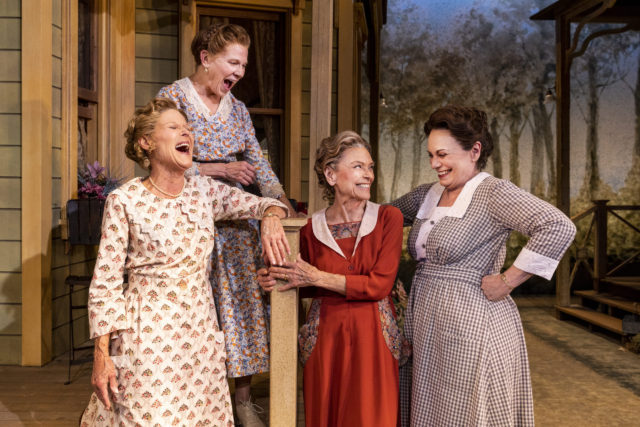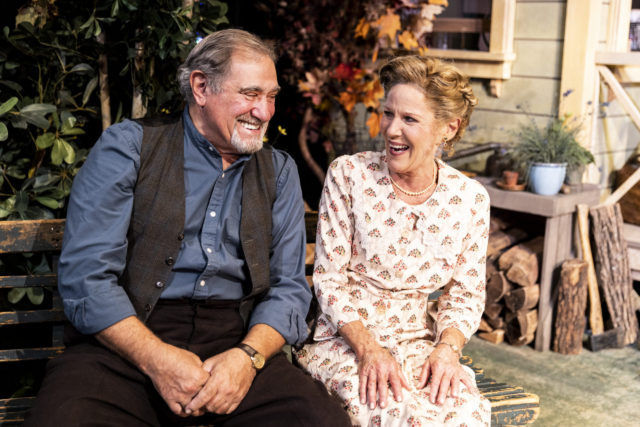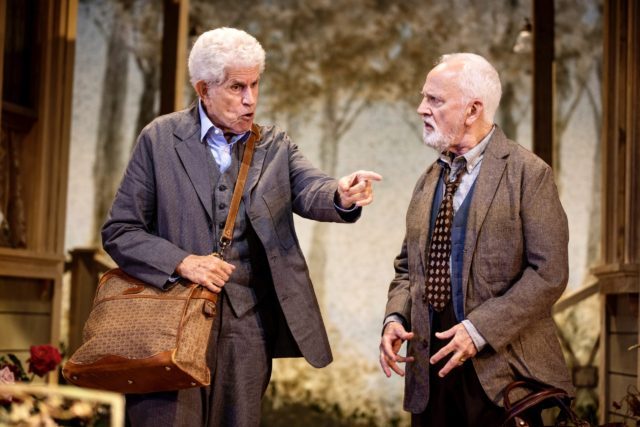
Alley Mills, Lindsay Crouse, Patty McCormack, and Alma Cuervo play four sisters in Morning’s at Seven (photo by Maria Baranova)
Theatre at St. Clement’s
423 West Forty-Sixth St. between Ninth & Tenth Aves.
Through December 5, $44
www.morningsat7.com
It’s a shame that Dan Wackerman’s warm and cozy adaptation of Paul Osborn’s 1939 family comedy, Morning’s at Seven, is ending its run a month earlier than planned at the Theatre at St. Clement’s, closing on December 5 instead of January 9. It certainly can’t be because of the overall quality of the show, which is first-rate, with an outstanding cast and a terrific set. Perhaps it’s the space itself; over the last nine years, I’ve seen only one other play at the theater that I’ve heartily recommended (although I was in the minority); this is the second.
The three-act, 135-minute show (including one intermission) is set in an unnamed middle America small town in 1922, in a quaint backyard shared by an extended family. In one house, Cora (Lindsay Crouse) and her husband, Thor (Dan Lauria), live with one of Cora’s sisters, the single Arry (Alley Mills). Next door, another sister, Ida (Alma Cuervo), lives with her husband, Carl (John Rubinstein), and their forty-year-old nerdy son, Homer (Jonathan Spivey). The fourth and oldest sister, Esty (Patty McCormack), lives a few blocks away with her condescending professor husband, David (Tony Roberts), who thinks her relatives are a bunch of morons. Everyone (except David) is all atwitter that Homer is finally bringing home his girlfriend, Myrtle (Keri Safran), after dating her for twelve years. The general expectation is that Homer will finally marry Myrtle and move into the nearby house on Sycamore Drive that his father Carl built for them, off in the distance as if a beacon of hope. (The homey, comfortable set is by Harry Feiner, with modest, unembellished period costumes by Barbara A. Bell.)
But all is not a Thomas Kinkade / Norman Rockwell scene. Carl has what at the time would be called “a nervous condition,” suffering from vaguely existential spells in which he thinks he is a failure and asks himself, “Where am I?” When the supercilious David finds Esty visiting her family against his wishes, he declares her to be a “free agent” and banishes her to the second floor of their house while he plans to live on the first, barely interacting with her. It soon becomes evident that Arry is no mere old maid but has been in love with Thor for decades. And Cora dreams of at last being alone with her husband, a considerate, likable man who smokes a pipe and prefers to avoid controversy.

Dan Lauria and Alley Mills of The Wonder Years reunite in John Osborne revival (photo by Maria Baranova)
“Cora’s made a couple of awful funny remarks lately about me living by myself. She’s got some bee in her bonnet. She’s up to something,” Arry tells Thor. “Oh, she isn’t either,” Thor says. “Well, she hadn’t better be, that’s all I say,” Arry adds. “Now, your home’s right here with us, Arry. Just as long as you want it,” Thor promises. Arry replies, “Well, don’t you forget it either.” Of course, Cora is up to something, and this long-suffering sister is plotting to take home all the pie, as it were.
Over the course of less than twenty-four hours, long-held secrets, and new ones, emerge as a nine people take stock of their lives, asking themselves, “Where am I?” And they’re not always satisfied with the answer to a question that the audience itself can relate to. It’s probably one of the reasons why the play has been so successful on the rare occasions it has been mounted, earning a slew of Tony awards and nominations for its 1980 and 2002 Broadway revivals, for example.

David (Tony Roberts) has some pointed advice for Carl (John Rubinstein) in Morning’s at Seven (photo by Maria Baranova)
It’s also a treat to watch a play starring seven wonderful actors in their seventies and eighties, at the top of their game. Lauria (Lombardi, A Christmas Story The Musical) and Mills (The Bold and the Beautiful, Bad Habits with her late husband Orson Bean) rekindle the chemistry they had as the father and mother on The Wonder Years from the 1980s; Mills ably stepped in when Judith Ivey tore a tendon during previews. Obie winner and Emmy and Grammy nominee Crouse (The Homecoming, Places in the Heart) is touching as the woman caught between them.
Oscar nominee McCormack’s (The Bad Seed, Frost/Nixon) Esty is just the right foil for two-time Tony nominee Roberts’s (The Tale of the Allergist’s Wife, Play It Again, Sam) ornery and persnickety David, while Obie winner Cuervo (Uncommon Women and Others, On Your Feet!) is appropriately motherly to everyone, especially Tony winner Rubinstein’s (Pippin, Children of a Lesser God) Carl, who is a lost little boy except when he has his manly tools. Safran (Typhoid Mary) and Spivey (The Front Page) hold their own in such talented company as the naive, somewhat simpleminded young couple trying to figure out how to start their life together while the others are closer to reaching the end of theirs.
Obie winner Wackerman (Rocket to the Moon, Ten Chimneys), of the Peccadillo Theater Company, makes the audience feel like it’s a part of this small community, investing in the gossip and intimate drama of a family that unknowingly hides behind false modesty and a self-imposed politeness. They live in their own bubble; they don’t talk about politics, or the economy, or war, which is refreshing. Oscar and Tony winner Osborne, who wrote such hard-hitting plays as Look Back in Anger, The Entertainer, and Luther, took a lighter approach with Morning’s at Seven, and it works wonderfully in this version. Catch it while you can at this theater of doom.